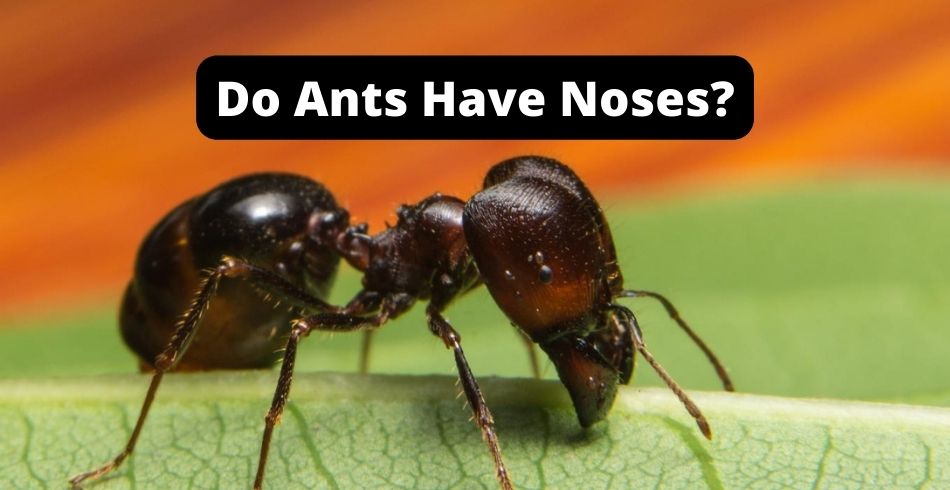If ants can find the food you drop at your picnic that fast, it must mean they have a nose… right? Well, it’s not entirely true, and it’s not completely false, either. Do Ants Have noses?
Ants have one of the strongest senses of smell yet do not have noses. The odor receptors of ants are four to five times better than in other insects. Ants smelling organs are the antennae protruding at the front of the ant’s head.
Do ants have five noses?
Ants have zero noses. Instead, they have a pair of antennae that detect smells as a nose does in humans. Ants use the antenna to locate food, touch and feel things around them and pick up pheromone trails left by other nestmates.
The ability of the human nose to pick smells is quite good.
But, compared to the smelling capabilities of ants, our nose is actually pretty bad.
Ants do not have noses, but research shows they possess four to five times more olfactory sensors than other insects. (Source)
This biological advantage lacking in other insects makes the ants’ smell capability superior and far more advanced than human beings.
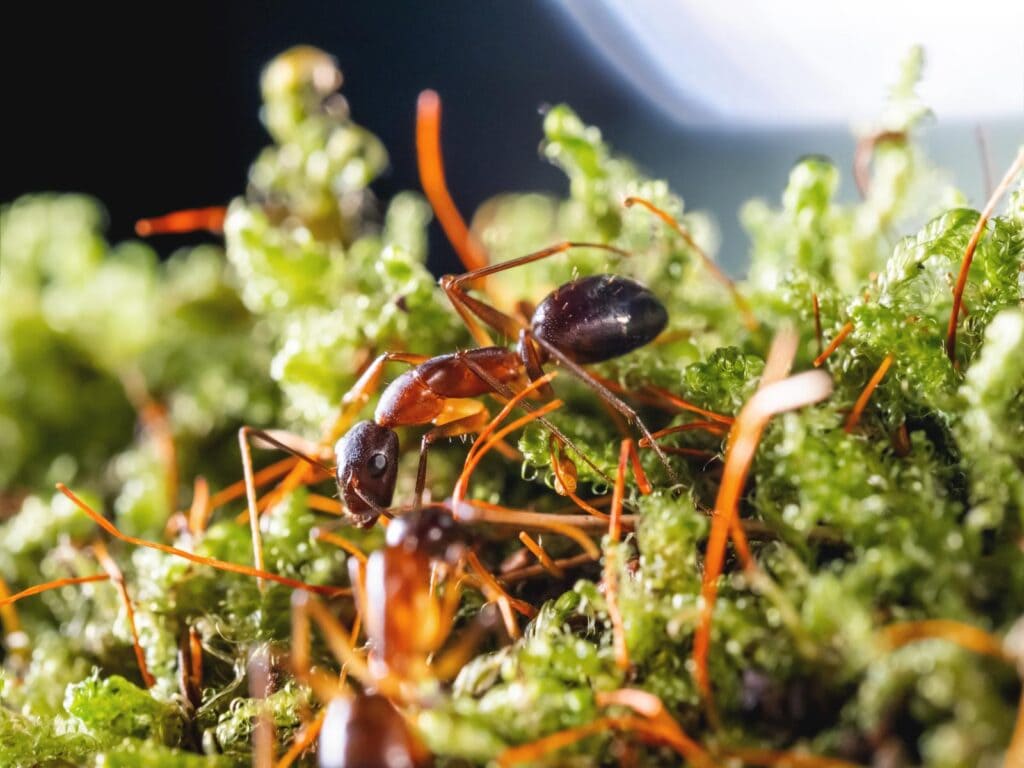
Do ants have antennae?
Ants are insects, and like all insects, they have antennae. The work of the antennae in insects is smelling and has olfactory receptors which decipher odors. Ant’s ability to smell is exceptionally well developed compared to other insects, and ants smell very low volatility compounds with high levels of precision.
Antennae are not just for smelling; ants communicate with them.
Since ants neither talk nor hear, antennae are extremely useful in passing messages in virtually all ant species.
Ants are in the category of arthropods with antennae.
This classification has four broad classes
Arthropod Classes | Animals |
Crustacea | Isopods, Mantis Shrimp, Barnacles |
Hexapoda (Insecta) | Flies, Ants, Bees, Wasps, Cockroaches |
Arachnida | Spiders, Ticks, Scorpions, Mites |
Myriapoda | Milipedes, Centipedes, Pauropods |
Insecta (Hexapoda)
Insecta is a strong class and the largest arthropods phylum by size.
Classically identified by their three-part body system –
These three body parts are the thorax, abdomen, and head.
Creatures of this class enjoy long legs, compound eyes, and one sole pair of antennae.
This is where ants belong!
As a quick note, spiders are not part of this phylum! Spiders do not have six legs!
Crustacea
Crustacea mainly live in water or wet conditions, and examples are Isopods, Mantis Shrimp, and Barnacles.
Myriapods
Myriapods are another category.
Creatures in this phylum have many legs.
Good examples are Millipedes and Centipedes.
Arachnida
The last group is the Arachnida.
Organisms in this category have two body parts.
Characteristically different from the creatures in the other three types, arthropods do not have antennae.
Notable examples are spiders. (Source)
Can ants smell?
The sense of smell of ants is one of the most advanced among insects. An ant’s olfactory system is also much superior to that of humans. Ants smell food sources using their antenna, and they also use them to smell ant pheromones, i.e., chemical signals left by other ants.
The latter is particularly useful to workers.
Ants are social insects and accomplish tasks as a team.
To keep track of each other, they leave chemical trails.
When searching for food, once an ant locates a food source, it leaves a chemical line for nestmates from the food source back to the nest.
Ants trace these chemical odors left by others using the antenna.
Once the ant returns to the nest, the others accurately locate the food source by following the pheromone trail of nestmates.
As more and more worker ants locate the food and leave more pheromone trails, others follow suit.

This ant behavior explains the phenomena where a swarm of ants quickly invade food you’ve recently dropped.
All the ants need is one ant to find it, and soon you will see the whole colony after it!
The more the food supply, the faster the ant’s speed to and from the nest.
What’s also interesting is the more food, the more worker ants that will be sent.
So if you accidentally leave out a whole sandwich, you’ll get the entire colony!
How far can an ant smell?
Ants’ odor receptors are not only sensitive, but they are also able to pick smells remarkably far away from the ant, considering its size. Distances between 3.3m to 5.9m are within the range an ant can detect food smells.
Ants have adapted different techniques that enhance the ability to smell foods, especially in harsh environments.
On top of their highly developed smell glands, most ant species have a biological mechanism that maps routes to known food sources. (Source)
Some species that forage individually do not leave pheromone cues for fellow ants.
Instead, they tap into crosswinds for any food smell in the surrounding air.
Their antennae detect even the tiniest bits of prey smells from the wind currents.
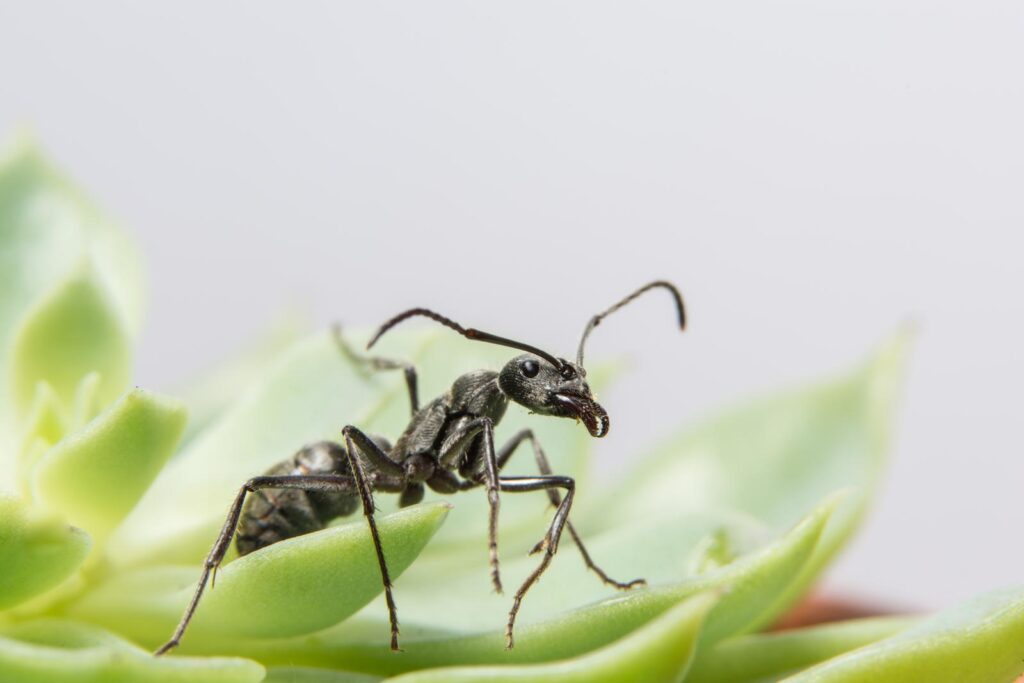
How strong is an ant’s sense of smell?
Ants have an exceptionally strong sense of smell, enabling them to pick up pheromone smells and emit different odors while identifying each uniquely. Ants have a host of glands that emit many different smells and uniquely decode what each means.
For instance, an ant encounters an enemy and sends alarm pheromone cues.
Another ant picks the smell and responds to the defense call.
If the ant senses that more help is required, it also emits an alarming smell, and others join in defense.
One research team established that ants can pick two or more chemical odors within the same chemical formula.

Specifically, ants can smell short molecules such as hydrocarbon chemicals that humans can’t.
The studied ants could pick and discriminate between two molecules in one chemical substance, which human noses cannot do.
Can ants smell food?
Ants do not have well-developed eyes to see, identify, and differentiate between foods. Instead, they rely on their sense of smell. Most sweet-smelling foods or decaying meat have a dense molecular chemical composition, thus emitting a scent picked up by humans and ants quickly.
But, unlike humans, ants can pick out food chemical signals that are much harder to smell.
Do ants smell wood?
Ants can smell wood. Some ants prefer this smell, and we commonly refer to these ants as wood ants. These ants burrow in decaying wood and use its insulation to get through the harsh winters.
Once ants locate food utilizing their advanced sense of smell, they eat the food in tiny particles.
But in contrast, ants that identify, find, and attack wood do not do so for food.
So, if ants attacking wood is not for food, why do they do it?
We often find ants in the field or forest where they make nests and forage food.
Quite different from other ants are the carpenter ants, and they are primarily seen living and chewing up wet or damp wood.
Going by the usual ant behavior of any species, you’d think carpenter ants chew wood for nutrition purposes.
Far from it.
These ants attack wood to create nests.
They dig tunnels in the wood to ease their movement when transporting food.
Like other ants, they live on sugars and protein diets.
They particularly love honeydew made by aphids, and they eat dead insects or attack and kill ants and insects for their protein.
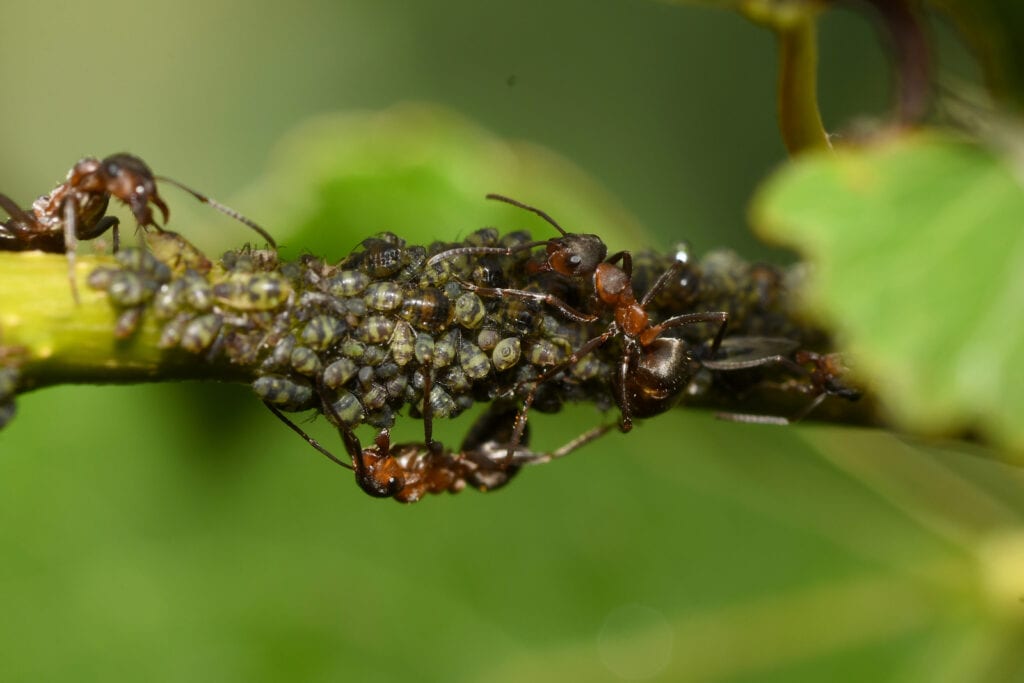
How do ants find food?
Ants find foods relying on their highly developed sense of smell and teamwork. Workers forage areas near the nest. When an ant finds a food source, it leaves a trail of pheromone chemical signals that workers follow to reach the food location.
As the other workers follow the pheromones to the food sources, they mark their paths too.
In no time, an entire colony invades the food.
They collect bits of food and rush back to the nest to feed the queen and larvae.
Where possible, whole pieces such as insects legs or body parts are transported by several workers for storage.
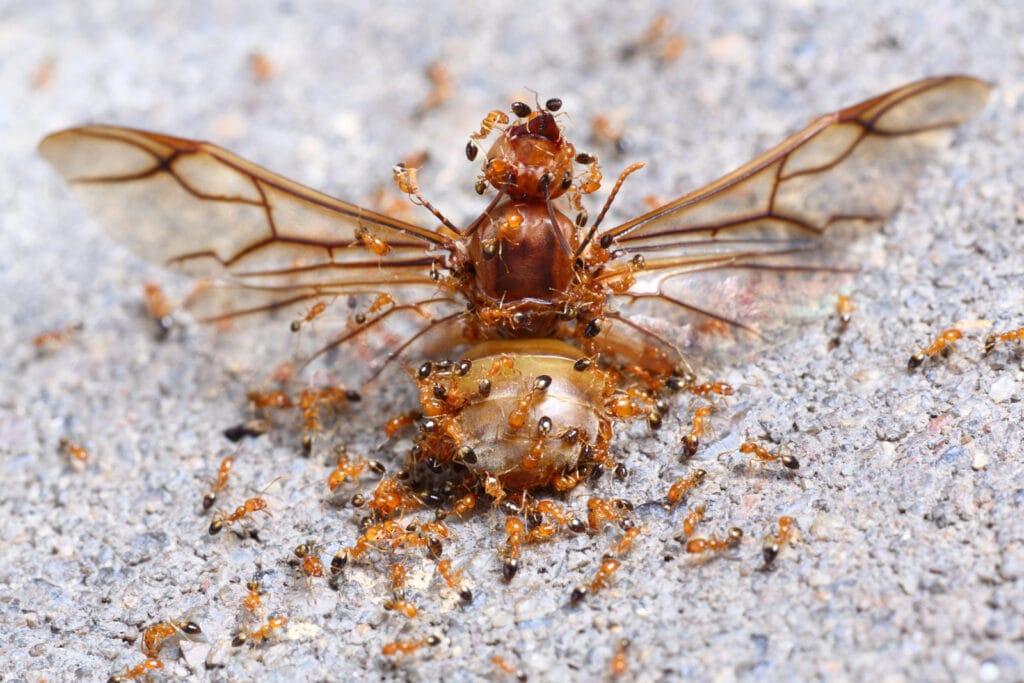
What smells are ants attracted to?
Ants are attracted to the smell of foods, especially sweet ones such as sugar, honeydews, plant syrups, and rotting or overripe fruits. Ants also get attracted to the chemical odor trails left behind by ants in the same colony for foraging and when seeking suitable mates.
Understanding the odors ants prefer is helpful to humans in two ways.
If you farm ants for pets (have an ant farm), you know the food with smells they like and desire.
Secondly, killer baits are made using food materials that attract them.
For instance, mixing baking soda with sugar is an effective ant killer.

Naturally, ants get attracted to sugar, consuming lethal sodium bicarbonate molecules as they feed on sugar.
Additionally, knowing the smells that ants are not attracted to helps you understand suitable repellents to keep them away.
[amazon box=”B00K1JFC0S”]
Can ants smell other ant species?
Ants quickly pick up smells of enemy intruders or rival ants from different colonies. The ability and sensitivity to the smells of ants from other colonies are essential for a colony’s survival.
A quick response to an intrusion enables colonies to mobilize soldiers’ defenses.
Where necessary, ants move larvae and the queen to avoid being entirely run over.
Remember, sometimes ants have satellite nests.
While it looks like ants of different colonies are “getting along,” they’re actually the same colony spread throughout a central area (usually fields or forests).
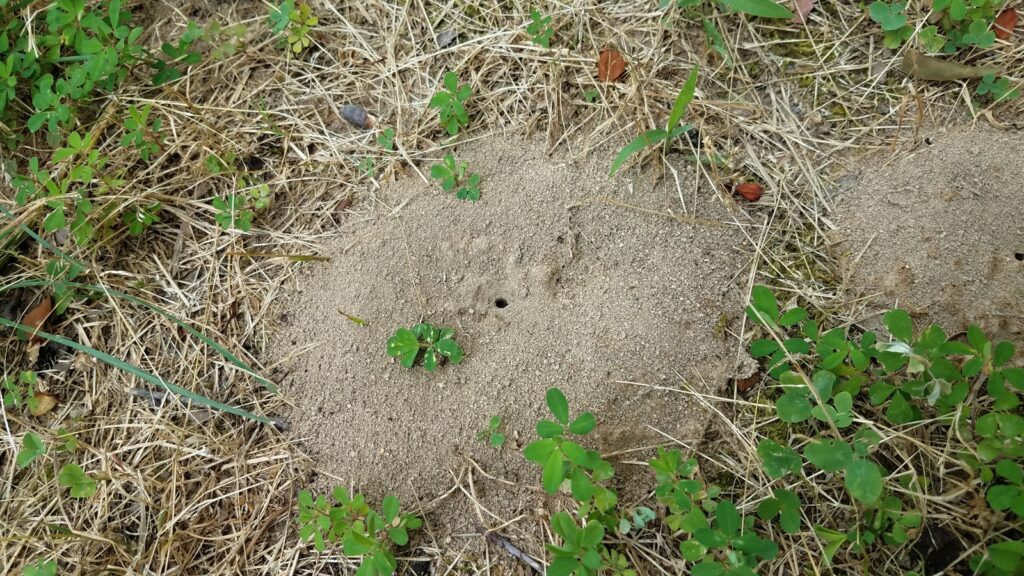
What smell do ants hate?
Ants do not like all smells; some smells they hate are from ordinary household foods or items. The smell of citrus fruits, cucumber slices, peppermint-scented fluids, and cinnamon are smells ants dislike. Ants also detest strong-smelling alcohol products, engine oil (used or new), and rubbing compound detergents.
Knowing the smells ants hate is helpful in ant control.
You can apply products with scents that ants detest to alter or divert the route of an invading ant colony.
Some products, like peppermint oil mixed with water or rubbing compounds mixed with water and sprayed directly on the ants, kill them.
For coffee drinkers, it’s interesting to learn that ants hate the odor of ground coffee.
After making your cup of coffee, apply the residues to cracks or spread them on flower beds to drive them away.
To make the ground coffee even more potent, mix it with peppermint oil and spray in desired areas.
Anise oil repels some insects and may be used to repel ants too.
In general, insect repellent products emit odors that drive away ants.
